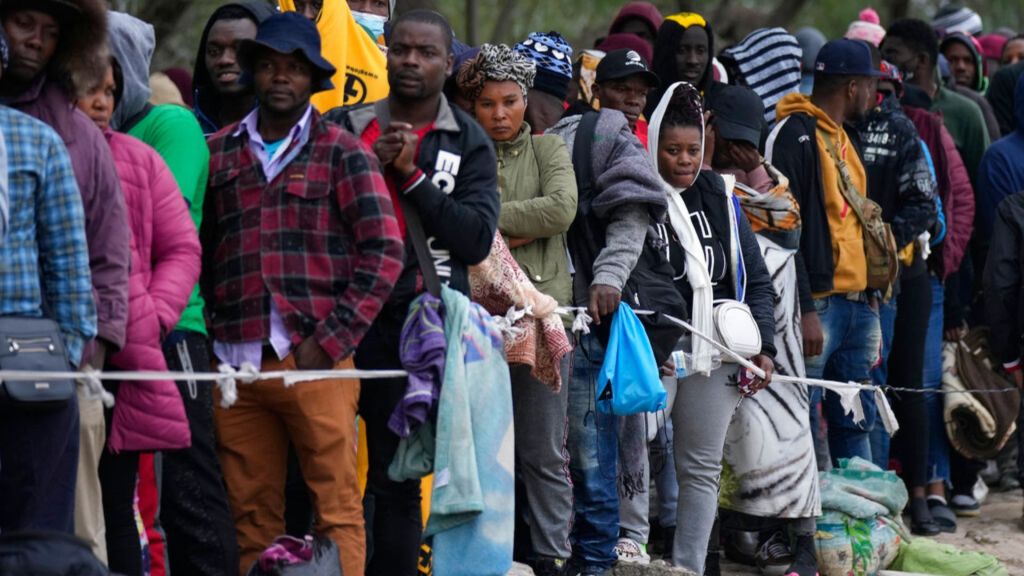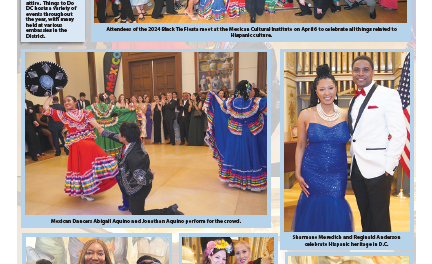By Ashlee Banks
Special to the AFRO
On Jan. 23, a federal judge temporarily blocked President Donald Trump’s executive order seeking to strip U.S. citizenship from children born to undocumented parents, labeling the action “undeniably unconstitutional.” This marked the first significant legal challenge in a multi-state effort to counter the policy, which has drawn sharp criticism for disproportionately affecting Black migrants and their families.

(Credit: AP Photo/Fernando Llano )
Ratified in 1868, the 14th Amendment to the Constitution was a landmark provision meant to ensure citizenship rights for formerly enslaved African Americans following the Civil War. For over 150 years, it has served as a cornerstone of equality in the United States, guaranteeing citizenship to anyone born on U.S. soil. Yet, just two days after being sworn in for his second term, Trump issued an executive order to undermine this protection in a stated effort to curb unauthorized immigration.
The order would deny U.S. citizenship to children born after Feb. 19 if their parents reside in the country without legal status. It further bars federal and state agencies from recognizing such individuals as citizens, effectively blocking them from obtaining crucial documentation like birth certificates and passports. Critics argue this measure directly targets Black migrant communities, particularly those from the Caribbean and Africa, who already face systemic discrimination within immigration and legal systems.
U.S. Rep. Yvette Clarke (D-N.Y.-9), a daughter of Jamaican immigrants, condemned Trump’s executive order.
“We will not yield to Mr. Trump’s impropriety, illegality, and cruelty. He will not intimidate us,” Clarke said in a statement. “My citizenship is my birthright. If Donald Trump wants to tell me, my family, my neighbors in Brooklyn and across New York and around the United States that our citizenship is illegitimate and we are not proper Americans, then he should expect to hear from the tens of millions of Americans he just disgraced. We are witnessing a shameless abuse of power, and I can say with certainty the immigrant community will not stand by as it progresses further.”
The executive order immediately faced legal challenges nationwide, with at least 22 states and several immigrants’ rights groups filing lawsuits. Washington, Arizona, Oregon, and Illinois led the first case to receive a hearing, prompting the Jan. 23 court decision to temporarily suspend the policy for 14 days. This reprieve allows both sides to present further arguments about the constitutionality of Trump’s order.
For Black migrant families, the stakes are deeply personal. Many come to the United States seeking refuge from political instability, economic hardship, or systemic racism in their home countries. Advocates warn that rescinding birthright citizenship would leave countless Black children stateless, denying them access to education, healthcare, and job opportunities while reinforcing the marginalization of their communities.
U.S. Rep. Sydney Kamlager-Dove (D-Calif.-37) stated that the executive order is fundamentally cruel.
“Donald Trump cannot erase the fundamental truth that the United States is a nation of immigrants. He may push his anti-immigrant agenda, but he cannot diminish the diverse cultures and identities woven into the tapestry of our country,” Kamlager-Dove said in a statement.
Black immigrants make up roughly 10 percent of the U.S. foreign-born population but are disproportionately affected by immigration enforcement. Policies like the one proposed by Trump compound these challenges, leaving Black migrants more vulnerable to deportation, detention and economic instability.
The Trump administration has defended the executive order, arguing that it aligns with the original intent of the 14th Amendment. In a statement, the Department of Justice vowed to “vigorously defend” the policy, claiming it “accurately interprets the Constitution.” However, legal experts and historians have widely refuted this interpretation, noting that the amendment was specifically designed to prevent the exclusion of any group based on their ancestry or status.
Birthright citizenship, or jus soli, the “right of the soil” is a principle upheld by about 30 countries worldwide, including Canada and Mexico. While it has long been a cornerstone of American identity, Trump’s order represents a dramatic departure from this tradition, reigniting fears of exclusion and second-class citizenship for millions, particularly in Black and Brown communities.
As the legal battle unfolds, advocates for immigrant and civil rights are rallying to ensure that the principles of equality and inclusion remain intact. For many Black migrants, the fight to preserve birthright citizenship is not just a legal issue, it is a matter of survival.
The post Black migrants caught in the crossfire of birthright citizenship battle appeared first on AFRO American Newspapers.










